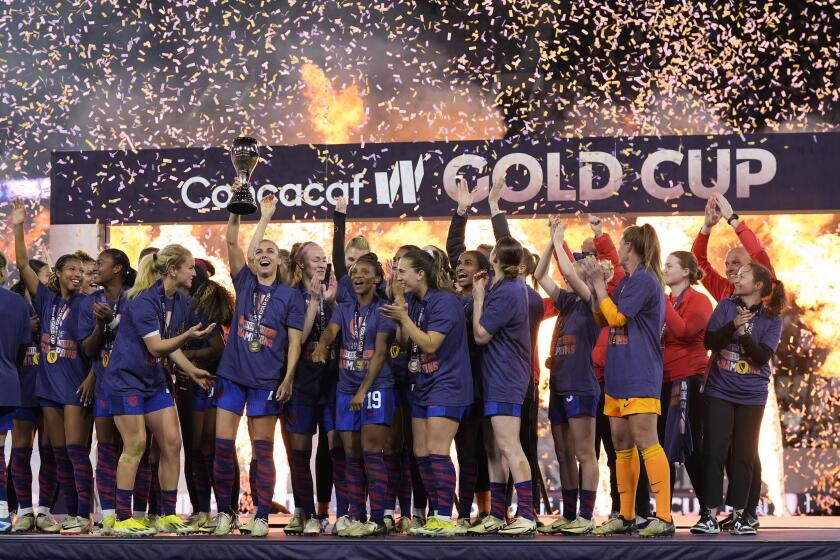GATE CRASHERS
The only thing not completely stupefying about Sunday’s men’s Olympic super giant slalom was that Norway won.
Kjetil Jansrud became the fourth straight Norwegian to claim the super-G gold, so just go ahead and pencil in a Kjetil, Aksel or Lasse for 2018.
Everything else about Sunday’s result was pulled out of a magician’s hat.
America’s Andrew Weibrecht, four years after stunningly taking super-G bronze in Vancouver, and having done absolutely nothing since, stole silver from his back-of-the-snowpack No. 29 start position.
For a racer nicknamed “The War Horse,” skiing so late on a rutted-over track was like having 20 pounds added to your saddle at Santa Anita.
Weibrecht’s parents, Ed and Lisa, did not make the trip to Sochi. “I told them not to,” he said.
Why travel all the way from Lake Placid, N.Y., to see an old “horse” break down again?
Weibrecht had face-planted his slalom run in Friday’s super combined and said he considered retirement “as recently as yesterday.”
He is only 28 but has had more body work done than a rent-a-wreck.
Weibrecht nearly lost funding from the U.S. Ski Team and might not have been named to the Olympic team had Thomas Biesemeyer not broken his leg.
Jansrud had wrapped up gold and was resting comfortably in the finish area after posting his unassailable winning time of 1 minute 18.14 seconds. Bode Miller and Canada’s Jan Hudec also watched as they contemplated how strange it was going to be sharing the silver with the exact same time of 1:18.67.
Miller and Hudec instead shared bronze because Weibrecht pushed out and pointed his skis straight downhill in his usual (reckless) style. He’s the guy teammate Ted Ligety said was the world’s fastest skier for 20 seconds until he crashed into the safety nets.
Weibrecht, on cue, had the fastest first interval. But he didn’t crash, and kept charging.
Jansrud suddenly stopped visualizing where he was going to hang his gold medal back in Stavanger. “My legs were a little jelly there for a second,” he confessed.
Only Jansrud’s brilliant finish at the bottom of the course, where he beat Weibrecht by half a second, saved an emergency call to the engraver.
Weibrecht’s time of 1:18.44 put him .30 back of the winner.
Miller and Hudec won bronze and some much-needed glory for their countries. Hudec’s Olympic medal was Canada’s first in Alpine since Ed Podivinsky finished third in downhill in 1994.
Miller’s sixth Alpine medal moved him to the upper crust of Olympic history. He now has one gold medal, three silver and two bronze. Only Norway’s Kjetil Andre Aamodt, with eight medals, has more hardware among men.
Miller, 36, also became the oldest Alpine athlete to medal in the Olympics. “I feel old,” he joked.
Miller was unusually emotional, in contrast to the clinical way he usual dissects a ski race.
Miller mentally collapsed under the weight of his brother Chelone’s death last April, at age 29, of a seizure. “Everything felt pretty raw and pretty connective,” Miller said. “It was a lot for me.”
The two medals doubled America’s Alpine total through the first five Sochi events and may inspire a closing-week revival.
Weibrecht’s silver was enthusiastically hailed by teammates who have watched him struggle.
Ligety, the reigning super G world champion whose huge mistake between “Bear’s Brow” and “Lake Jump” cost him any medal chance (he finished 14th), was happy to radio up crucial information to keep Weibrecht from the same mistake.
“He’s been due,” Ligety said. “It’s good to see him get rewarded.”
A group of reporters stood in the mixed zone and listened to a speakerphone hookup with Weibrecht’s parents. Dad said you couldn’t print his initial reaction after Andrew’s silver medal, while Mom said she fretted about her son’s bad start position.
“I think he decided to go for broke and see what happened,” she said.
If Weibrecht had luck on his side Sunday, well, maybe he was due some to offset the four surgeries he’s undergone since Vancouver -- right shoulder, left shoulder, right ankle, left ankle.
He’s had only two top-10 World Cup results in his career. One was a harrowing 2007 downhill performance at Beaver Creek, Colo., in which he finished 10th after barreling through a snow storm from the No. 53 start position.
“He’s got some courage,” U.S. men’s Coach Sasha Rearick said. “Without a doubt.”
“The War Horse,” more than once, almost put himself out to pasture.
“There’s been times when I’ve had to evaluate whether this is what I want to do, as recently as yesterday,” Weibrecht said. “There’s only so many times you can get kicked before you start to feel it.”
Weibrecht had a different feeling Sunday.
“I try not to focus on results,” he said, “but I really needed a result to remind me, more than anything, that I’m capable of this. And that I belong here.”
--
Twitter: @DufresneLATimes
--
Alpine skiing
Men’s super-G
*--* G Kjetil Jansrud Norway | 1:18.14 S Andrew Weibrecht United States | 1:18.44 B Jan Hudec Canada | 1:18.67 B Bode Miller United States | 1:18.67 *--*
More to Read
Go beyond the scoreboard
Get the latest on L.A.'s teams in the daily Sports Report newsletter.
You may occasionally receive promotional content from the Los Angeles Times.






